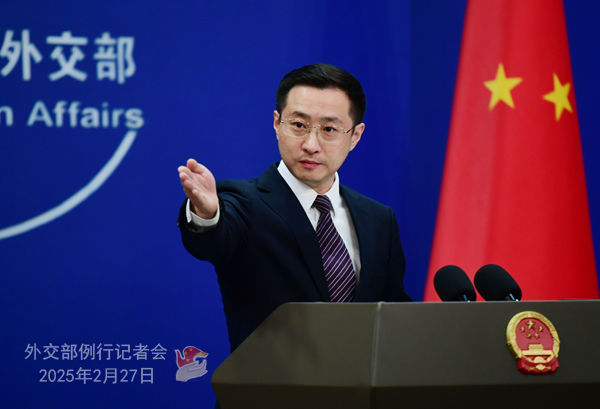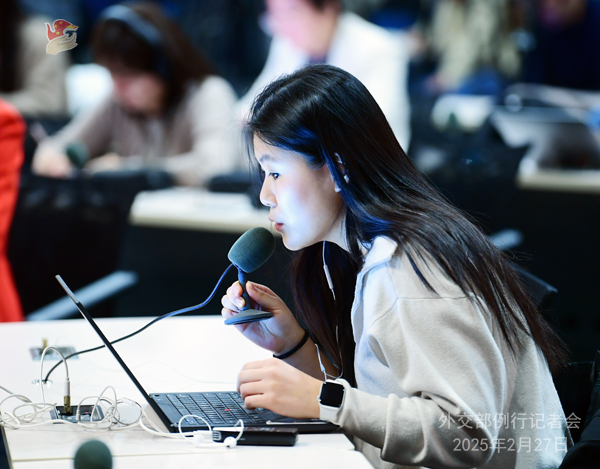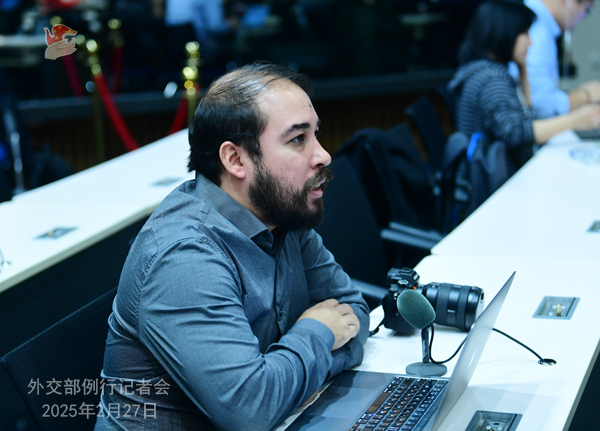
CCTV: Some foreign media recently said that, in a world with worsening turbulence and a manifold increase of factors of uncertainty and instability in the global economy, the world needs a country acting as a stabilizer and leader in the world economy, but it seems that China shows little willingness to play such a role. What’s your comment?
Lin Jian: China has been a stabilizer of the world economy. As the second largest economy in the world, China contributes to around 30 percent of global growth annually on average. We are the major trading partner of over 150 countries and regions, and remain the largest trader in goods and the second largest importer for years running. China is an indispensable part of the stable and unimpeded supply and industrial chains in the world.
China advocates a universally beneficial and inclusive economic globalization. We uphold that all countries need to jointly make the pie of economic growth bigger and distribute it better, and engage in and benefit from global economic growth on an equal footing. The “we first” approach and the domination by one country is not what the world economy needs. In recent years, China has accelerated the development of new quality productive forces, and injected driving forces to the transformation and upgrade of the world economy through its high-quality development. China has been committed to expanding high-standard opening up, and sharing with businesses from all around the world the benefit of its supersized market with a better business environment and a shorter negative list. China has deepened cooperation in global connectivity. Local people in relevant regions get better off thanks to fast and convenient logistics networks, including China-Europe freight trains and the new western land-sea corridor train service. China has led the global green and low-carbon transition. We have provided solutions with cost-effective and climate-friendly technologies to the Global South countries for their low-carbon development. In recent years, China has rolled out in Africa over 100 programs in clean energy and green development, such as the solar power farm in Kenya and the De Aar wind power project in South Africa. “It’s the Chinese friends who have brought light and hope to our land,” said the locals movingly.
China will continue to put development front and center on the agenda of international community, embrace the vision of a community with a shared future for mankind, firmly act as an “enabler,” and provide more stability and certainty for the world economy.
AFP: A human rights group has urged the Thai government to immediately halt plans to deport over 40 Uyghur men who have been detained in Thailand for years, saying they will face human rights violations in China. Is China in contact with the Thai government on this plan and have the men in question returned to China? What is the Foreign Ministry’s comment?
Lin Jian: On February 27, 40 Chinese nationals who illegally entered Thailand have been repatriated to China. The repatriation is carried out in accordance with the laws of China and Thailand as well as international law and common practices. It is a step taken by the two sides to jointly combat human smuggling and other cross-border crimes. The lawful rights and interests of individuals concerned are fully protected.
Illegal migration and smuggling are internationally recognized crimes, which seriously disrupt the normal cross-border order. The Chinese government firmly opposes all forms of human smuggling. We will continue to fight crimes that involve obstructing national frontier and border administration in accordance with law, and hold those planning and organizing such activities accountable for legal responsibilities. Meanwhile, China will actively participate in global security governance and strengthen international law enforcement cooperation with relevant countries, in an effort to jointly address the challenge of cross-border crimes, guarantee the safe and orderly flow of Chinese and foreign nationals, and protect the lawful rights and interests of inbound and outbound travelers.
As for the remarks made by certain institution that you just mentioned, I would like to point out that China upholds the rule of law and has well-developed laws and regulations and working mechanisms in human rights protection in the judicial area. Its achievements are there for all to see. All Chinese, including the Uyghurs in Xinjiang, fully enjoy economic, social, and cultural, civil and political rights. Some political forces and institutions fabricate and spread Xinjiang-related lies for no other reason than destabilizing Xinjiang. We stand firmly against the attempts to use human rights as a pretext to interfere with China’s internal affairs and to use Xinjiang-related issues to disturb normal law enforcement cooperation between countries. Certain parties must stop concocting and spreading Xinjiang-related lies and absurd accusations.

TVT Brazil: Yesterday, the first sherpa meeting took place under the presidency of Brazil. They discussed the six main topics decided by the presidency of Brazil. One of them is the governance of artificial intelligence. President Lula said that Brazil is going to propose leaders’ declaration this year on the governance of artificial intelligence for development. He said that the BRICS nations should bring the states back to the center of these debates. So I would like to ask you, what is, for the Chinese side, the main concerns regarding the needs of the governance of artificial intelligence? And the second question will be, if these discussions within the United Nations don’t evolve as fast as they should, what should be the steps that the BRICS nations should take?
Lin Jian: China is committed to developing AI that is for good and for the people, secure and under control, green and low-carbon, as well as universally beneficial and inclusive. AI is the common wealth of mankind. It should not and cannot be reduced to a tool for perpetuating hegemony and seeking supremacy. In the development and governance of AI, countries need to support each other, work together, make sure that all countries enjoy equal rights, equal opportunities and equal rules, jointly foster an open, inclusive, universally beneficial and non-discriminatory environment for the development of AI, and bring the benefit of AI to all countries. We support BRICS countries in playing a greater role in global AI governance. China stands ready to work with all parties to contribute to bridging the AI gap and promoting global sustainable development.
Bloomberg: In an interview, U.S. Secretary of State Marco Rubio expressed concerns over the relationship between China and Russia, saying that Russia is too reliant on China and that the two countries, that’s Russia and China, both of which are nuclear powers, could join hands against the U.S. My question is, does the Foreign Ministry have any remarks on Secretary of State Rubio’s comments?
Lin Jian: China and Russia are two major countries. Our bilateral relationship has a strong internal driving force. It will not be affected by any third party. Both China and Russia have long-term development strategies and foreign policies. No matter how the international landscape changes, our relationship shall move forward at its own pace. The U.S. attempt of sowing discord between China and Russia is doomed to fail.
AFP: Taiwan’s defense ministry today said it detected 45 Chinese aircraft and 14 warships near the island today. Would the Foreign Ministry like to comment on this?
Lin Jian: There is no so-called “defense ministry” in Taiwan. And this is not a question related to foreign affairs.
AFP: Just on yesterday’s meeting between New Zealand’s Foreign Minister Winston Peters and China’s Foreign Minister Wang Yi. Mr. Peters raised concerns over the lack of adequate warning on live-fire drills conducted. Does the Foreign Ministry have any additional comment on that meeting or on how China plans to handle future live drills?
Lin Jian: As for the visit of New Zealand’s Deputy Prime Minister and Foreign Minister Winston Peters, you may refer to the readout we’ve released. We shared information and made clear our position on the relevant issue more than once. We stand ready to strengthen dialogue and communication with New Zealand, enhance mutual understanding and work for the sound and steady growth of bilateral relations.
TVT Brazil: In the No.1 central document released recently, there was a new term the government used, which is “the new quality rural productive forces.” If you could comment on the importance of this new term for the Chinese economy?
Lin Jian: Thank you for your interest in China’s development. I’d like to refer you to the competent authorities for further information on this question. I also suggest that you keep following the upcoming two sessions for anything you want to know.
